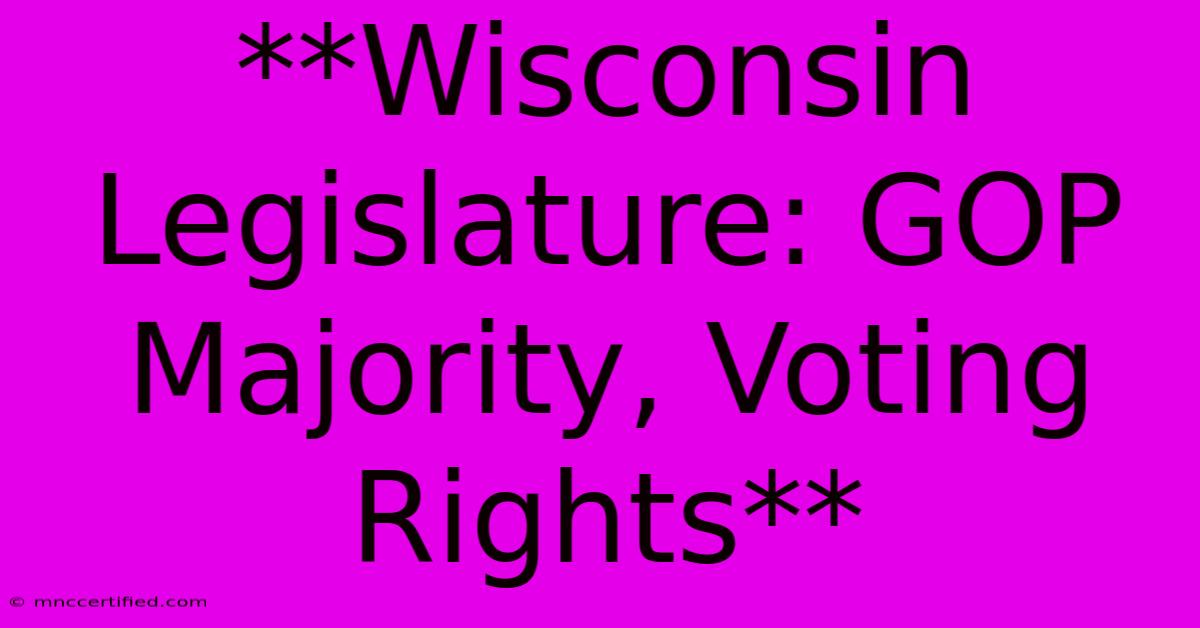**Wisconsin Legislature: GOP Majority, Voting Rights**

Table of Contents
Wisconsin Legislature: A GOP Majority and the Fight for Voting Rights
The Wisconsin Legislature, comprised of the Assembly and Senate, currently sits under the control of the Republican Party. This control has a significant impact on the state's political landscape, particularly when it comes to voting rights.
A Republican Dominance: The Impact on Voting Rights
Since 2011, Republicans have held a majority in both the Assembly and Senate, often leading to policies that have been perceived as restrictive towards voter access.
Here are some key areas where the GOP majority has influenced voting rights:
- Voter ID Laws: Wisconsin has a strict voter ID law that requires voters to show photo identification at the polls. Critics argue this law disproportionately affects minority voters and those with limited access to IDs.
- Early Voting: Wisconsin's early voting period is relatively short compared to other states. Republicans have consistently opposed efforts to expand early voting opportunities, which advocates argue would increase voter turnout, especially among working-class and minority voters.
- Absentee Voting: While Wisconsin allows absentee voting, the GOP majority has implemented stricter requirements for absentee ballots, making it more difficult for some voters to cast their ballots.
- Gerrymandering: The process of drawing electoral district boundaries has been a subject of debate, with accusations of gerrymandering favoring Republicans. This practice can create districts where one party has an unfair advantage, potentially limiting the impact of voter choice.
The Fight for Voting Rights in Wisconsin: A Balancing Act
The GOP majority's stance on voting rights has sparked intense debate and activism.
Here are some key groups and efforts working to protect and expand voting rights:
- Non-profit Organizations: Groups like the League of Women Voters of Wisconsin and the American Civil Liberties Union (ACLU) of Wisconsin are actively engaged in legal challenges and voter education campaigns, advocating for fair and accessible elections.
- Civil Rights Groups: Organizations like the NAACP and the Wisconsin Alliance for Justice are fighting against voter suppression tactics and working to empower marginalized communities to exercise their right to vote.
- Grassroots Movements: Citizen-led initiatives, often fueled by social media, have emerged to raise awareness about voting rights issues and mobilize voters.
The Future of Voting Rights in Wisconsin: A Complex Landscape
The battle over voting rights in Wisconsin is likely to continue.
Here are some factors that will likely influence the future:
- Legal Challenges: Ongoing legal challenges to Wisconsin's voting laws will continue to shape the debate and potentially lead to court rulings that could alter the landscape of voting rights.
- Public Opinion: The level of public engagement and pressure on elected officials will influence their willingness to support or oppose changes to voting laws.
- National Trends: National discussions about voting rights and electoral integrity are likely to influence the state-level debate in Wisconsin, potentially leading to changes in policy or increased activism.
The Importance of Engaging in the Debate
Regardless of your political affiliation, it is essential to stay informed about the issues surrounding voting rights in Wisconsin. Engage in respectful dialogue, educate yourself about the different perspectives, and consider getting involved in efforts to protect or expand access to the ballot.
The future of voting rights in Wisconsin will be shaped by the actions of individuals, organizations, and elected officials. The fight for a fair and inclusive electoral process requires ongoing vigilance and commitment from all stakeholders.

Thank you for visiting our website wich cover about **Wisconsin Legislature: GOP Majority, Voting Rights**. We hope the information provided has been useful to you. Feel free to contact us if you have any questions or need further assistance. See you next time and dont miss to bookmark.
Featured Posts
-
Does Homeowners Insurance Cover Caregivers
Nov 07, 2024
-
American Summit Insurance Customer Service
Nov 07, 2024
-
Republican Election Denial A Persistent Issue
Nov 07, 2024
-
Bristol West Insurance Cancellation Policy
Nov 07, 2024
-
Trevor Sorbie Speaks On Terminal Cancer
Nov 07, 2024